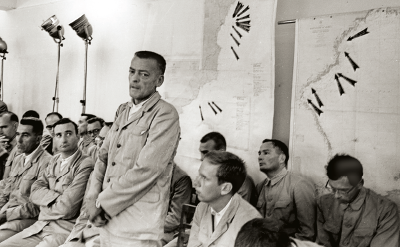Returned Crew From Captivity Raised Thoughts for Later POWs
Abstract
The return of prisoners after the 1968 capture of a U.S. Navy ship sparked thinking about how best to bring home POWs or hostages.
The October 18, 1972, issue of Psychiatric News included a story about the return, nearly four years before, of U.S. Navy personnel captured by North Korean forces in what became known as the Pueblo incident.

The Pueblo was a Navy intelligence-gathering ship seized by North Korea on January 23, 1968. One American was killed and 82 others taken prisoner and harshly treated for 11 months before being released on December 23, 1968.
The men were quickly flown to the San Diego Naval Hospital for a Christmas Eve reunion with relatives, followed by intensive physical and psychiatric examinations. A summary of results of the latter was reported in the American Journal of Psychiatry in July 1972, an article that served as the basis for the news story and recounted here as part of our look back at 50 years of Psychiatric News.
Raymond Spaulding, M.D., and Charles Ford, M.D., organized a team of six Navy psychiatrists to evaluate the men.

This 1968 photo shows Commanding Officer Lloyd M. Bucher, the captain of the USS Pueblo, and his crew while being held captive by North Korea. The Pueblo was classified as an environmental research ship, but was actually used for gathering intelligence.
About half the men reported feelings of anxiety during captivity, and 16 experienced depression, wrote Spaulding and Ford in 1972. A few factors were consistent among crew members who coped well with confinement, they said—faith (in their leaders), reality testing, denial, rationalization, and humor. (The last included the surreptitious extension of middle fingers in a propaganda photograph taken by the clueless North Koreans.)
“The men who did better would in general be characterized as bright and schizoid,” wrote Spaulding and Ford. “[They] had an ability to isolate their affect and entertain themselves with fantasy.”
“This was an opportunity for me to understand how men who were relatively healthy were able to handle stress in different ways,” recalled Ford, now a professor of psychiatry at the University of Alabama at Birmingham, in an interview. “Some natural leaders emerged, although not always the senior officers. They made life better for the rest of the crew through their altruism while others fell apart.”
Once home, most were found fit to return to duty, but at a second evaluation three months later, things had changed.
“In contrast to the bland but cooperative demeanor initially seen, many men were openly antagonistic and hostile toward both the Navy and their fellow crew members,” wrote Spaulding and Ford. “There was evidence of considerable acting out with alcohol and drugs, minor traffic violations, and squandering of back pay.”
A similar pattern was observed in American POWs released from Japanese and North Korean prison camps after World War II and the Korean War, said the authors. Perhaps some of those effects might have been averted by not rushing the ex-POWs home for “sentimental reasons,” they said. “In retrospect there is a question whether the needs of either the men themselves or the U.S. Navy were best met by hastening their return to the U.S.”
“We recommended a delay of several weeks in returning home after their release,” recalled Ford. Such a pause was built into the return of previous generations of POWs, who traveled slowly, by ship, on their way home and had time to talk with comrades about their time in prison camps.
“It would be important to allow people to decompress, to readjust to their families, learn something about changes in the U.S., and talk about their experiences,” he said. “That would probably reduce acting out and risky behavior.”
The Pueblo incident and the return of its crew came during the heart of the U.S. War in Vietnam, during whose course several hundred U.S. servicemen were taken captive. Spaulding and Ford suggested that the Pueblo crew’s experience might inform the ultimate return of those prisoners, and it may have done so in part.
The Vietnam War POWs spent a week with their families at Clark Air Base in the Philippines after their release in 1973 before returning to the United States, said Robert Ursano, M.D., who later studied the U.S. Air Force aviators in that group.
“The issue is how to foster the best recovery for returning POWs or hostages,” said Ursano, now a professor and chair of psychiatry at the Uniformed Services University of the Health Sciences in Bethesda, Md., in an interview.
“Part of the recovery [of released prisoners of war or hostages] has to do with mental health, and part has to do with the challenges of facing the media and the stresses their families have dealt with,” said Ursano.
“I think most people would say that it helps to have a graded re-entry and more time to accommodate,” he said. “It comes down to the personal experience of the degree of trauma, deprivation, and maltreatment. If severe, it can burden a person for a lifetime.”
Ford thought about those long-term consequences 45 years ago. He and Spaulding talked about doing an extended follow-up study of the Pueblo crew using a sister ship’s men as a control group, but that was never authorized. Anecdotally, he heard that many of the men did not do well in later years, he said. “But I had the feeling then of being privileged to be a part of history.” ■



